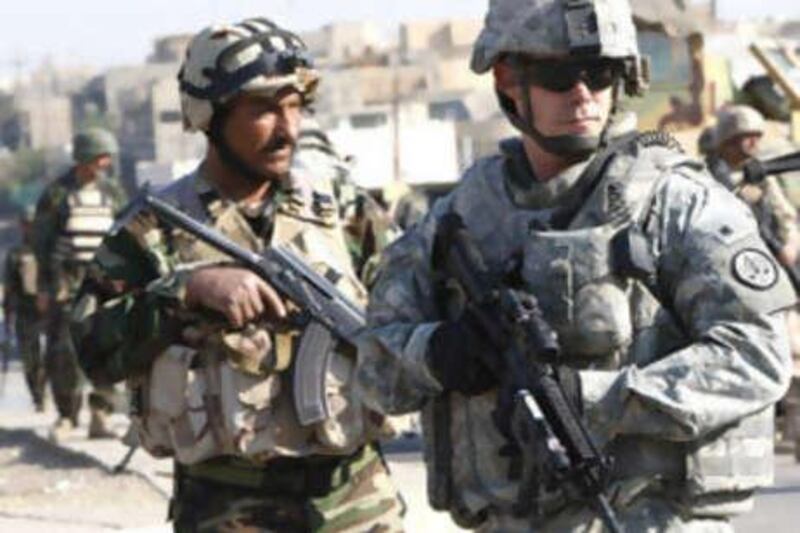DAMASCUS // After months of wrangling and delay, the Iraqi government's approval of a status of forces agreement overseeing US forces in their country offered a stark reflection of a country that, despite its recent progress, remains chaotic, unstable and dangerous. The Iraqi prime minister, Nouri al Maliki, has sought - and won - various concessions since negotiations on the Status of Forces Agreement (Sofa) began this year. The Bush administration initially refused to talk of a date for troop withdrawal; refused to allow that US soldiers should face Iraqi courts for crimes; refused to accept that contractors and mercenaries should be stripped of legal immunities.
But under the terms of the security pact agreed by cabinet ministers in Baghdad yesterday, those key issues are, in some form or other, addressed. The current deal stipulates that US forces are to pull back from Iraqi cities by June 2009 and leave Iraq entirely by 2011; that Iraq has the right to try US soldiers and defence contractors for serious crimes; and that the United States cannot use Iraq as a staging post for attacks on other countries. In some respects, this reframed deal is an indicator of Mr Maliki's improved standing. His decision to fight campaigns against Shiite militias, as well as Sunni extremists, has made him a more credible figure among Iraqis, and given him the confidence to insist on tougher terms with the United States. Once seen as weak and indecisive, he is now viewed - by no means in all circles - as a more respectable, tough nationalist leader. His supporters will point to the renegotiation of the agreement as further evidence he is not just a patsy but in fact a champion of Iraqi sovereignty.
Yet for all of the sound and fury of the negotiation process, which was replete with veiled and not so veiled threats from all sides, there is a strong undertone of style over substance. The troop withdrawal dates are targets, not set in stone. They are designed to appease the widely held sentiment among Iraqis that US forces must not be allowed to stay indefinitely; that they are a tolerated, necessary nuisance rather than welcomed guests. In reality, as of today there seems scant prospect that every US soldier will have left Iraq within the next three years, and all 400 or so US bases closed. But the suggestion this is going to happen makes the Sofa more palatable to a sceptical Iraqi public. It is an unremarkable and understandable political survival tactic to make a promise that will get broken, if that is what it takes to gets out of a tight spot and buy some time.
The immediate crisis was that come the end of the year, the UN mandate for the US military presence in Iraq expires. Without a new deal, US troops would have been in a legal limbo and could have been confined to their bases and the country handed back to insurgents. That prospect has now been forestalled. Those currently controlling the government in Baghdad do not like to admit the US military is what keeps them in power and it is not good politics for them to shout openly they actually do want the US forces to stay. A good portion of the debate surrounding the Sofa has been a matter of pre-election posturing; parties are preparing for next year's provincial ballots, and all want to look sufficiently anti-US even though the thought of a quick withdrawal would probably have scores of MPs catching the next flight back to London. The question of legal immunity is also mainly cosmetic because it covers US soldiers when they are off duty and off base. US soldiers in Iraq rarely leave their fortified camps without helicopter gunship air cover - it is too dangerous. And they are hardly likely to be out on the streets while off duty. On top of that, US legal advisers working in Iraq privately admit that the justice system is deeply flawed and does not come close to meeting US standards. Under such circumstances is the US government really going to hand their soldiers over for trial? The final sticking point during negotiations - a guarantee that US forces will not use Iraq as a platform for attacking other states - is similarly academic. Last month's raid by US special forces across the Syrian border that left eight people dead, including a suspected al Qa'eda organiser, has not even been officially acknowledged by the US authorities. As far as they are concerned, it never happened. Presumably, something that never happened can just as easily never happen again in future. The Status of Forces Agreement has only been approved by the Iraqi cabinet. It has now been submitted to the national parliament, with Mr Maliki saying only a two-thirds majority vote in favour will see it passed into law. That may not happen but the odds are in favour of it being approved. Then it will be a matter of time testing the authenticity of the deal. If the troops do pull out, if mercenaries or soldiers do commit crimes for which they stand trial in Iraqi courts, it will be possible to look back and see the 2008 Sofa as a positive milestone. And it will be possible to talk about Iraqi sovereignty as something that is real and growing in strength. psands@thenational.ae





